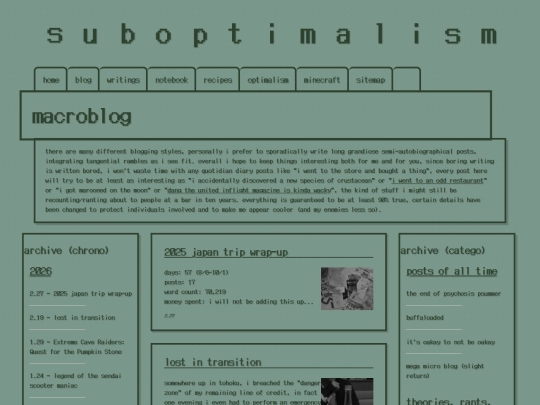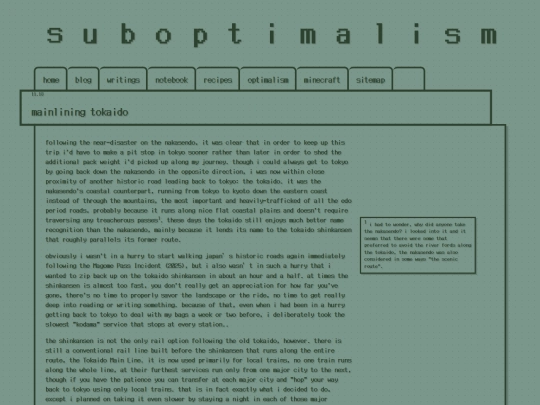 suboptimalism
2 months ago
suboptimalism
2 months ago
i was actually thinking the same thing yesterday when i was working on something and looking at the actual pages themselves extensively instead of just working inside code editor the whole time...
 suboptimalism
2 months ago
suboptimalism
2 months ago
at the same time, i like the "no cheap thrills to be had here!" vibe you get from going monochrome
 goeshard
2 months ago
goeshard
2 months ago
nice site. I read your old Yesterweb analysis post btw. I know that was a long time ago but I still laughed because I remember that absolutely ridiculous document and went through the same experience of unraveling it that you did!
 suboptimalism
2 months ago
suboptimalism
2 months ago
i think a lot of people were bamboozled into thinking it had substance by the lofty academic obscurantist style and excessive length... i guess the medium is the message, as they say
 suboptimalism
2 months ago
suboptimalism
2 months ago
i hate that it's the most popular post ever on my site, it disappoints me that nothing plays better online than discussing internet drama (sometimes it feels like that's the main function of the internet), but i guess if that piece lured in just one person who then read the rest of my bs too then maybe it's worth it...
 goeshard
2 months ago
goeshard
2 months ago
Sorry then for contributing to that feeling. I wouldn't say it was what drew me it, but it's just nice to know I wasn't the only one that went through that thought process when that happened. I'll be following your site and paying attention to you in the future though in any case.
 suboptimalism
2 months ago
suboptimalism
2 months ago
yeah, it's unfortunate i couldn't keep it up for long because they didn't end up having one easy dish to cook per episode for the rest of the show, i was under the mistaken impression at the start that it would similar to those kodomo anime where they guarantee you one henshin per episode. i probably would have run out of steam at some point anyway though...
 suboptimalism
2 months ago
suboptimalism
2 months ago
it kinda ended up turning into a travel show and funnily enough, i did do a bit of a travel-along and went to two of the places they took trips to in the show
 suboptimalism
2 months ago
suboptimalism
2 months ago
i'm probing new depths of cursed lazy japanese cooking nowadays thanks to this cookbook i picked up called the "motivation 1% cookbook", 2023's bestselling cookbook in japan, including gems like "microwave teriyaki chicken" and "cup noodle chahan"
 projectc190
3 months ago
projectc190
3 months ago
omfg i was looking at the pics and being like "these look awfully familiar i'm not sure if this is japan" LOL





















































































































































































more importantly, Yokosuka is the setting of Shenmue; you really should have walked around asking where you could find some sailors...